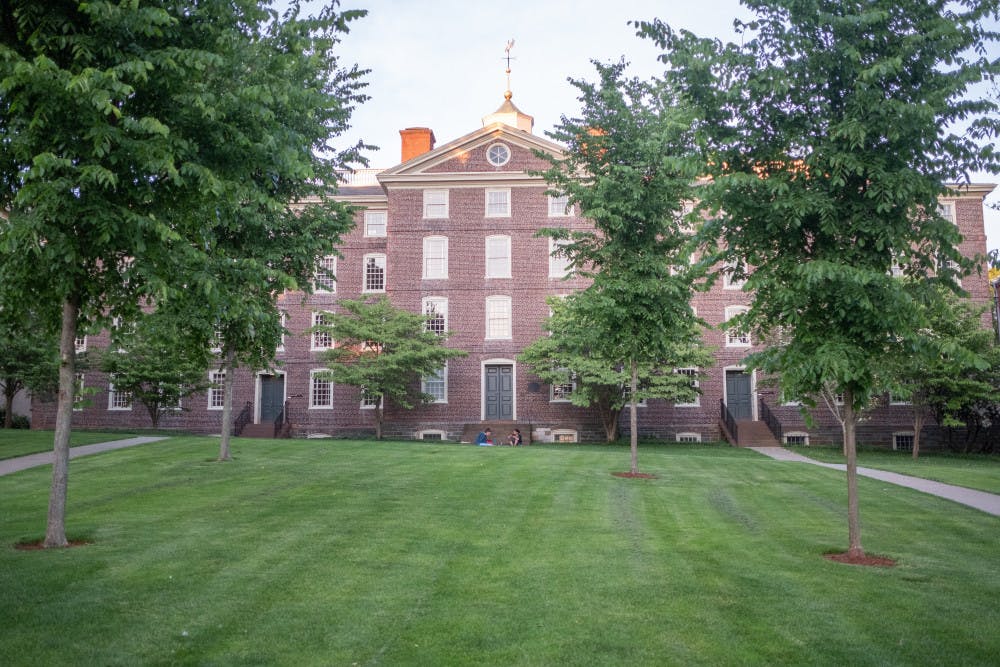Brown will welcome back more undergraduates to its residence halls and hold some small, in-person classes this fall.
The decision was influenced by improvements in Rhode Island’s public health situation, low positivity rates from Brown’s COVID-19 testing program and low demand for isolation and quarantine rooms at the University, President Christina Paxson P’19 wrote in a Thursday community email announcing the reopening.
“We and other leaders in higher education well understand that nowhere in this country will the public health conditions be anything approximating 'normal' for a long time, considering the trajectory of the pandemic and the projected timeline for the widespread distribution of an eventual vaccine,” Paxson wrote.
“Yet for our own campus, what Brown and Rhode Island are currently experiencing is a set of conditions that may be among the most conducive to bringing more students back to campus that we’re likely to experience for up to a year,” she added.
About 900 undergraduates who have not yet returned to Brown could move back to Providence between Sept. 18 and 20, with some in-person instruction set to start Oct. 5.
The news of reopening comes after the University had pulled back on its initial reopening plan in August and instituted a “phased approach” to reopening. The new plan delayed the start of in-person, undergraduate classes to at least October and only welcomed back a limited number of students with extenuating circumstances to Brown’s residence halls.
Undergraduate move-in
Students returning to campus for Phase Two will be housed in separate residence halls from those who arrived in Phase One. The newly returning students will adhere to a 14-day quiet period and be enrolled in the University’s testing program like students who arrived in phase one.
Since the dates for move-in and quiet period coincide with Jewish High Holy Days, students observing the holiday will be able to request on the housing questionnaire an early move-in date prior to the holiday or late move-in date after the quiet period is done, according to a Sept. 2 email to students from Reslife.
Reslife also communicated that if “a sufficient number of members of a Greek or Program House” return in Phase Two they will try to group these students together. If there are sufficient spaces, members who returned in Phase One of move in could relocate after the second quiet period. Many of the outbreaks on campus on other college campuses have been associated with parties hosted by Fraternities or Sororities.
Students who are on campus will only be allowed to travel out of state during the semester in case of an emergency — for which they would need prior approval. Travel within Providence will be guided by the “prevailing Campus Activity Status level.”
“Improved public health situation”
When Brown’s original reopening plan was announced on July 7, the weekly average for new positive cases in Rhode Island was 49 cases. Cases rose as the summer progressed, and when the phased approach was announced on August 11 the weekly average was 95 new cases.
That has since slightly decreased, and in the past week of cases, R.I recorded a daily average of 80 cases.
As of Sept 2, 5,400 Brown community members were tested and only five of them tested positive after phase one of reopening campus began and the University welcomed 500 students back to residence halls starting on August 29.
The University’s announcement comes as many colleges have struggled to contain outbreaks on campus. The University of North Carolina at Chapel Hill was forced to shut down in-person operations after 135 students tested positive in the first week of classes and The University of Notre Dame moved to remote instruction for two weeks after 145 students tested positive after arriving on campus.
In her email, Paxson acknowledged that “colleges and universities across the country have had mixed success with returning to in-person instruction,” adding that “we are heartened to see that a number of our peer institutions that have testing and public health plans similar to Brown’s are faring well, and demonstrating that it is possible to learn to live with a virus that, unfortunately, may be with us for some time.”
Brown joins Cornell, Yale and Dartmouth as the only Ivies offering some sort of in-person instruction for the upcoming year. While allowing some students on campus, Columbia, Harvard, Penn and Princeton will have fully remote instruction for the semester.
Academic year
Remote instruction will continue until the week of October 5, when undergraduate classes with fewer than 20 students will be eligible to begin in-person instruction, according to the plan outlined Aug 11. Still, all classes are required to accommodate online instruction for students who will be studying remotely for the remainder of the fall semester.
The University still plans to proceed with the initial schedule for the tri-semester calendar, Paxson wrote. Unless it poses a danger to public health, first-year students are expected to come to campus in the Spring and the Summer. Paxson added that whether sophomores return to campus in the Spring or be designated to return in the Summer will rely on case levels and the availability of a potential vaccine.
“To a large degree, how the semester will unfold is up to us,” Paxson wrote. “We all must stand ready to make sacrifices in our social lives to protect Brown and the greater community, and to have a successful semester,” she added.
Correction: A previous version of this article stated that "in the past week of cases, R.I recorded 80 cases on average per week." In fact, Rhode Island recorded a daily average of 80 cases over seven days. The Herald regrets the error.

Jack Walker served as senior editor of multimedia, social media and post- magazine for The Herald’s 132nd Editorial Board. Jack is an archaeology and literary arts concentrator from Thurmont, Maryland who previously covered the Grad School and staff and student labor beats.





